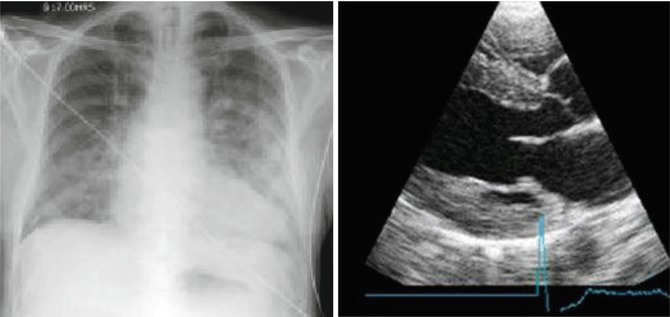and Christopher Isles2
(1)
Institute of Cardiovascular and Medical Sciences, University of Glasgow, Glasgow, UK
(2)
Dumfries and Galloway Royal Infirmary, Dumfries, UK
Q1 What is meant by the term cardiorenal failure?
Originally this was a term used to describe declining renal function in patients with advanced heart failure. Subsequently it was defined as a ‘pathophysiological disorder in which acute or chronic dysfunction of one organ may induce acute or chronic dysfunction in the other’. From a clinical point of view cardiorenal failure is best thought of as any disorder in which cardiac and renal dysfunction coexist.
Q2 Why is cardiorenal failure important?
Cardiorenal failure is common. In a large US registry based study, 9 % of patients with new onset heart failure or decompensated chronic established HF whose symptoms were sufficient to warrant hospitalisation had serum creatinine >265 umol/l. Cardiorenal failure is also dangerous. In a study of 1,004 patients hospitalized with symptoms and signs of heart failure, 27 % developed worsening renal function. There was a sevenfold increased risk of death in hospital in this group, after adjusting for medical history, clinical signs and lab values. From a practical point of view, it is not generally possible to treat the pulmonary congestion of cardiorenal failure with a bigger dose of diuretic without aggravating the renal failure.
Q3 What are the causes of cardiorenal failure?
The classification of causes adopted by experts in this field recognises five subtypes: acute or chronic cardiorenal, acute or chronic renocardiac and a fifth group in which systemic diseases such as sepsis cause both. This is not a clinician friendly classification as it makes little or no mention of the only potentially ‘curable’ cause of cardiorenal failure, namely bilateral renovascular disease, and also does not acknowledge the confounding influence of ACEI/ARBs. A more practical approach is to consider that either the heart causes the kidneys to fail, that the kidneys cause the heart to fail, something else causes both or the two are unrelated. These four diagnostic categories are described in more detail in the box.
Box 12.1 Causes of Cardiorenal Failure
Cardiac disease causes the renal failure. In an inpatient setting the classic presentation is a result of cardiogenic shock. In the outpatient clinic it is more likely to be a consequence of an ACE inhibitor or angiotensin receptor blocker
Renal disease causes the cardiac failure. This most often occurs when a dialysis patient fails to comply with fluid restriction & presents with shortness of breath due to fluid overload.
Bilateral renovascular disease causes both cardiac & renal failure. This is the most interesting of the causes because it offers the chance of a cure for both the cardiac & the renal failure. Unfortunately, reversible cardiorenal failure due to bilateral renovascular disease only accounts for a small proportion of patients who present in this way. The others have hypertensive nephrosclerosis.
Unrelated aetiology. One disease e.g. myocardial infarction causes the cardiac failure and another unrelated disease e.g. glomerulonephritis causes the renal failure.
Q4 When might you suspect bilateral renovascular disease as a cause of cardiorenal failure?
All patients with cardiorenal failure should have echo and renal ultrasound as part of their initial investigations. An echo showing LVH without dilatation (Fig. 12.1) and a renal ultrasound showing inequality of renal size (one kidney ≥1.5 cm smaller than the other) is highly suggestive, although it should be borne in mind that patients with bilateral renovascular disease do not always have significant asymmetry. Acute renal deterioration following ACE inhibitor is another useful clue (see case history and Fig. 12.2). In cases where revascularisation would be appropriate these findings should lead to imaging of the renal arteries (see Q7, Chap. 23).
 < div class='tao-gold-member'>
< div class='tao-gold-member'>





Only gold members can continue reading. Log In or Register to continue
Stay updated, free articles. Join our Telegram channel

Full access? Get Clinical Tree








